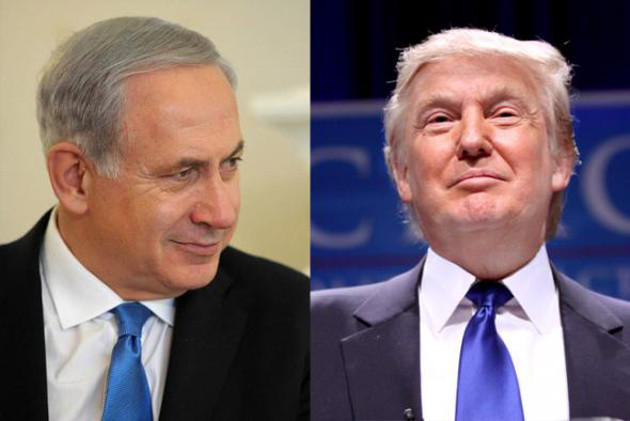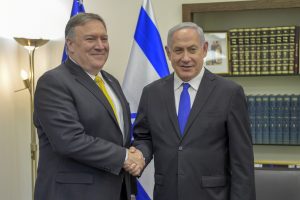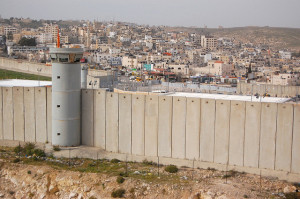by Mitchell Plitnick
As the joint press conference by President Donald Trump and Prime Minister Benjamin Netanyahu rolled on, it became clear that their prepared remarks were going to contain very little of substance. Trump looked stiff and uncomfortable as he read prepared remarks—so much so that he seemed visibly relieved when he added a few ad lib words of his own. Netanyahu spoke with great care, knowing that his real audience was back in Israel and that the coalition partners to his right needed to be placated.
But in the question and answer period, things got more interesting.
First, we had the clearest indication yet that the United States will support Netanyahu in stepping back from the two-state solution. Trump stated that he would support “the one that both parties like.” Netanyahu stated unambiguously that his red line is security control over all the territory to the Jordan River. That precludes any possibility of a sovereign Palestinian state.
While this may have been the most politically significant outcome of the press conference, the most eye-opening moment was when Trump was asked to directly denounce anti-Semitism. He didn’t even come close to doing so, side-stepping the question with a ham-handed response about all the love we were going to see in his administration and a mention of his son-in-law and daughter.
Shortly after, Netanyahu stepped up to defend Trump, assuring everyone that no one was a greater friend to the Jewish people or the Jewish state than the new President. As Israeli journalist Anshel Pfeffer tweeted, “Rabbi Netanyahu ends the press conference giving Trump a ‘Kosher’ stamp on his love for Jews. Many US Jews won’t like that.”
Not only many, a very clear majority won’t like it. Opinion on whether Trump himself is anti-Semitic is split among Jews, but concern over his actions is widespread. Trump’s connection to white nationalists through his aide, former Breitbart chief Steve Bannon, and his support from that sector have concerned Jews across the United States from the beginning. His refusal to acknowledge the unique Jewish connection to the Holocaust added a good deal of fuel to that fire.
Trump’s performance today will make it worse. The question he was asked was very specifically about rising anti-Semitism since his election. He did not acknowledge that rise, which is by now very well-documented. Nor did he denounce anti-Semitism, not even with a pro forma nod, saying it is not a good thing, something all but his most bigoted supporters would probably have shrugged off. He didn’t say he disagreed with it in any way, in fact.
But there was Netanyahu, the Prime Minister of the Jewish State, the man who has called the accurate labeling of products from Israeli settlements anti-Semitic. That man defended Trump from the accusation. That man, the same one who refused to comment at all on Trump’s refusal to mention Jews at all on Holocaust Remembrance Day, doubled down on his defense of Trump’s questionable actions today.
Coming into today’s meeting, the Trump Administration’s approach to Israel, the Palestinians and the broader Middle East was unclear. It’s only slightly less so now. But we do know a couple of things.
We know that Trump is not going to hold fast to a two-state solution. The fact that he has refused to talk with the Palestinian leadership (CIA Director Mike Pompeo’s meeting yesterday with Mahmoud Abbas notwithstanding) reinforces the hints that were dropped at today’s presser that Trump is seriously considering pursuing a deal between Israel and the Gulf monarchies and from there hoping to conclude a deal with the Palestinians. This ambition reflects a real lack of understanding of the political dynamics in the Arab world, and is almost certainly doomed to failure, but it seems that is a lesson Trump must learn for himself.
We also know that concerns over anti-Semitism matter not at all to the President or, quite sadly, to the Prime Minister. Those concerns were treated by both men today as nothing more than a political toy, a matter of no concern beyond how it needed to be handled and how it could be manipulated for political gain.
In these conditions, it is difficult indeed to fathom how things can improve for Israel, let alone for the Palestinians. Indeed, based on what we saw today, any movement from the already terrible status quo is almost certain to make matters worse.
Republished, with permission, from The Third Way blog.






JW: “There is no independent sovereign state of Palestine. One would have to be created out of some proposed peace treaty.”
Demonstrably untrue.
It is not at all necessary for there to be a peace treaty in order for the sovereign state of Israel to recognize the sovereign state of Palestine.
After all, no less than 139 states already recognize the state of Palestine, so it is axiomatic that not a one of them felt the need to see that Peace Treaty before offering that mutual recognition.
Israel could do that tomorrow: all it would need to do is to announce that it is officially reciprocating the unconditional recognition that the state of Palestine gave to the state of Israel way, way back in 1988.
Could be done and dusted in an afternoon, and then the day after could be spent in negotiations between those two states – the state of Israel and the state of Palestine – to thrash out a Peace Treaty that settles all disputes between those two states.
Explain to me why that can’t be done, Jeffrey.
After all, the PLO declared the state of Palestine back in 1988. They didn’t find it hard at all.
And it’s not that hard at all. The Palestinians already insist that they have declared the state of Palestine, and all it would take from the Israeli side is for Netanyahu to stand up and say “OK, fair enough”.
JC: “In my view, protecting the borders of Palestine is the key element (for those seeking resolution of the Israel/Palestine problem).”
Oh, I agree. Absolutely.
After all, there is a territory here that was seized at the point of a gun fully half-a-century ago, and those guns are still being pointed in the face of the inhabitants.
Those poor unfortunates will need some assurances that this overly-aggressive and territorially-ambitious neighbour isn’t going to keep returning the favour on a semi-regular basis
They are sure to want to ask how their borders are going to be protected from the over-armed, super-aggressive state that lurks just next door since – apparently – they are to be denied their own means of self-defence in the face of a demonstrably expansionist colonial power.
Can’t agree more.
But your suggestion appears akin to leaving the fox in charge of the hen-house.
This is an indisputable fact: there exists an army that has invaded the neighbouring territory, and then promptly sat its Big Fat Arse on said territory, and to this day is showing no inclination to get off its backside and go back home.
And this has surely escaped your attention – tho’ I can’t see how – but that arse isn’t Arab.
@Yeah, Right The Israeli occupation of the West Bank obviously is exceedingly repressive, to say the least. And continuing interventions by Israeli “security” forces would be unwelcome, for an independent Palestine. The issue, however, is how to resolve Israel/Palestine problem.
JC: ” The issue, however, is how to resolve Israel/Palestine problem.”
Again, I can only say that I agree. Completely.
Where we differ is in your concept that this “resolution” will happen if the IDF maintains perpetual military authority over both the state of Israel AND the state of Palestine.
That “resolves” nothing, it simply perpetuates the current belligerent occupation.
The state of Palestine has to be demilitarized? OK, fine, they appear to be agreeable to that proposition.
But SOMEBODY then has to guarantee the security of the state of Palestine, and it certainly isn’t going to be acceptable to them that this be the IDF, if for no other reason than the biggest security threat that the Palestinians will face into the foreseeable future is….. the IDF.
Pick someone else. NATO. The US Marines. Heck, even the Russian military.
But don’t suggest the IDF. That suggestion would be as unacceptable to the Palestinians as Hezbollah would be unacceptable to Israel.
And – let’s face it – the entire exercise is about “resolution”, not “imposition”.
@Yeah, Right I assume Israel would insist on controlling the borders of Palestine for an extended period. IDF should not be doing police work within Palestine, we very much agree.